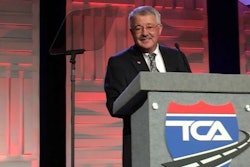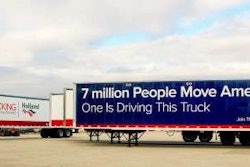A lumber industry trade association is seeking an exemption from Federal Motor Carriers Safety Administration rules, and the agency is seeking public comment.
The Great Lakes Timber Professionals Association is asking for an exemption that would allow its members’ carriers in Wisconsin to use cargo securement methods that don’t comply with current regulations.
A logging industry group is asking for an exemption of the rule on how logs are secured on a trailer.The FMCSA opened its 30-day comment period when it published a notice in the Federal Register on Wednesday, March 16. Comments can be made by searching Docket no. FMCSA-2016-0081 at www.regulations.gov.
The exemption is for securing shortwood logs transported lengthwise in crib-type vehicles that have been modified or manufactured without front structures, rear structures, or which have a center-mounted crane for loading and unloading, the request states. The GLTPA wants to use fewer tiedowns than regulations require.
The GLTPA says in its request that the “Cargo Securement Enforcement Policy” memo from the FMCSA in 2003 suggests “end stacks not protected by front and rear structures, but contained by stakes, bunks, or standards, would require one tiedown.” Because of this language, the association adds that crib-type trailers without front and rear structures would require one tiedown on each of the end stacks. GLTPA said the interior stacks, which are protected by the end stacks, should not be required to have tiedowns if they’re loaded in accordance with regulations.
“With the front and rear stacks secured, the configuration is essentially now acting as a crib-type vehicle,” the request states.
The GLTPA says it worked with the Wisconsin State Patrol Motor Carrier Enforcement Section to successfully test the use of a single tiedown on a stack of logs contained in a crib-type configuration.
GTPLA and the Wisconsin State Patrol believe the exemption will “provide relief to the timber industry without compromising safety,” the request states.








